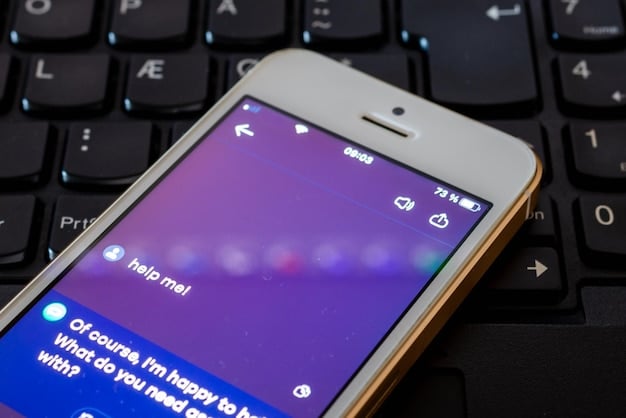Mobile Gaming Addiction: Signs, Risks & Where to Find Help in the US

Mobile gaming addiction in the US is a growing concern, characterized by excessive gaming leading to negative consequences; recognizing the signs, such as neglecting responsibilities and social isolation, is crucial for seeking timely intervention and support.
Are you spending countless hours glued to your mobile games? You are not alone. Mobile gaming addiction: recognizing the signs and finding help in the US, is a growing concern, but understanding the risks and where to find support is the first step towards reclaiming control.
Understanding mobile gaming addiction
Mobile gaming has become a ubiquitous form of entertainment, offering instant access to a vast library of games on our smartphones and tablets. While casual gaming can be a pleasant pastime, for some individuals, it can lead to a serious problem: mobile gaming addiction. Understanding what constitutes this addiction is crucial for both individuals and their loved ones.
This dependence can lead to significant consequences regarding relationships, work, financial, and also impact mental and physical health. Understanding the nature of this addiction as any dependence, provides the base for recognizing the signs and finding help.
What is mobile gaming addiction?
Mobile gaming addiction isn’t just about playing games a lot. However, the amount of time spent playing may be a factor to identify the addiction. It is a behavioral addiction characterized by the compulsive and excessive use of mobile games, resulting in negative impacts on various aspects of life. It’s similar to other behavioral addictions, such as gambling addiction, in that it triggers the brain’s reward system, leading to a craving for more despite harmful consequences.
Why are mobile games so addictive?
Several factors contribute to the addictive nature of mobile games:
- Accessibility: Mobile games are easily accessible anytime, anywhere, making it difficult to resist the urge to play.
- Reward Systems: Many mobile games are designed with reward systems that provide instant gratification, encouraging players to keep playing for that next achievement or virtual prize.
- Social Interaction: Some mobile games offer social interaction, creating a sense of community and keeping players engaged.
- Variety: The sheer variety of mobile games available means there’s always something new and exciting to try, preventing boredom and maintaining interest.
Understanding the dynamics of mobile game addiction is essential for identifying and addressing the issue. Recognizing the early signs can help individuals take proactive steps to prevent the addiction from spiraling out of control.
Recognizing the signs of mobile gaming addiction
Identifying mobile gaming addiction early on is essential for effective intervention and support. The signs can be subtle at first but become increasingly apparent as the addiction progresses. Knowing what to look for can make all the difference in addressing the problem before it leads to more significant issues.
Recognizing the signs early can enable proactive measures that help to prevent significant disruptions in daily life. Some key indicators can be easily noticed.
Key signs to watch out for
Here are some common signs that may indicate a mobile gaming addiction:
- Preoccupation: Constantly thinking about mobile games, even when not playing.
- Withdrawal Symptoms: Experiencing irritability, anxiety, or restlessness when unable to play.
- Tolerance: Needing to spend more time gaming to achieve the same level of satisfaction.
- Loss of Control: Being unable to reduce or stop gaming despite wanting to.

Behavioral and emotional indicators
Beyond the key signs, there are several behavioral and emotional indicators that can signal a problem:
- Neglecting Responsibilities: Failing to fulfill obligations at work, school, or home due to gaming.
- Social Isolation: Withdrawing from social activities and spending more time gaming.
- Lying: Deceiving others about the amount of time spent gaming.
- Mood Swings: Experiencing frequent mood swings, particularly when gaming is interrupted.
Recognizing these signs in oneself or a loved one is the first step towards seeking help. Awareness and early intervention can prevent the addiction from escalating and causing long-term damage to relationships, careers, and overall well-being.
Ultimately, acknowledging these signs is a critical first step toward addressing mobile gaming addiction effectively. By being vigilant and proactive, individuals and their families can take the necessary steps to regain control and promote healthier habits.
The risks and consequences of mobile gaming addiction
Mobile gaming addiction can have far-reaching consequences that impact various aspects of an individual’s life. From physical and mental health to social relationships and financial stability, the risks are significant and should not be underestimated. Recognizing these potential consequences is important for preventing and managing the addiction effectively.
Acknowledging the risks and consequences is important to handle with efficacy the prevention and management of addiction. The awareness of potential consequences turns into a conscious path.
The risks are varied and should be carefully considered.
Physical health impacts
Spending excessive time on mobile games can lead to several physical health problems:
- Eye Strain: Prolonged screen time can cause eye strain, dry eyes, and blurred vision.
- Carpal Tunnel Syndrome: Repetitive hand movements can lead to carpal tunnel syndrome.
- Poor Posture: Sitting in uncomfortable positions for extended periods can result in back and neck pain.
- Sleep Disturbances: Gaming late into the night can disrupt sleep patterns and lead to insomnia.
Mental health impacts
In addition to physical health, mobile gaming addiction can also negatively impact mental health:
- Anxiety and Depression: Excessive gaming can contribute to feelings of anxiety and depression.
- Increased Stress Levels: The pressure to perform well in games or the fear of missing out can increase stress levels.
- Social Anxiety: Reduced social interaction can lead to increased social anxiety.
- Cognitive Impairment: Prolonged gaming can impair cognitive functions such as attention, memory, and decision-making.
Social and financial consequences
The consequences of mobile gaming addiction extend beyond individual health:
- Relationship Problems: Excessive gaming can strain relationships with family and friends.
- Job Loss: Neglecting work responsibilities can lead to poor performance and job loss.
- Financial Difficulties: Spending money on in-app purchases or neglecting financial obligations can result in financial difficulties.
- Academic Failure: Students who are addicted to mobile games may experience poor academic performance.
Ultimately, understanding the risks and consequences of mobile gaming addiction is essential for motivating individuals to seek help and make positive changes. By recognizing the potential harm, individuals can take proactive steps to protect their health, relationships, and overall well-being.

Finding help: resources and treatment options in the us
If you or someone you know is struggling with mobile gaming addiction, it’s important to know that help is available. In the United States, there are various resources and treatment options to support individuals in overcoming this addiction and regaining control of their lives.
The first step could be to recognize the problem, and then identify the available resources to seek support to manage the addiction and get a better balance of the daily routine.
Therapy and counseling
Therapy and counseling are effective treatment options for mobile gaming addiction:
- Cognitive Behavioral Therapy (CBT): CBT helps individuals identify and change negative thought patterns and behaviors associated with gaming addiction.
- Individual Counseling: One-on-one counseling sessions provide a safe space for individuals to explore their gaming habits and develop coping strategies.
- Group Therapy: Group therapy offers support and encouragement from peers who are also struggling with gaming addiction.
- Family Therapy: Family therapy can help address relationship issues caused by gaming addiction and improve communication within the family.
Support groups and online resources
Support groups and online resources offer additional avenues for help and support:
- Online Forums: Online forums provide a platform for individuals to share their experiences, ask questions, and receive support from others.
- Support Groups: Support groups, such as those offered by organizations like the National Center for Responsible Gaming, provide a sense of community and shared understanding.
Professional treatment centers
For individuals with severe mobile gaming addiction, professional treatment centers may be necessary:
- Inpatient Treatment: Inpatient treatment involves staying at a treatment facility for a period of time to receive intensive therapy and support.
- Outpatient Treatment: Outpatient treatment allows individuals to receive therapy and support while living at home.
Discovering these resources is a crucial step to overcome addiction. Individuals need support to manage and to deal with such problem.
Seeking help is a sign of strength, and it is an essential step towards recovery. By accessing these resources and treatment options, individuals can overcome mobile gaming addiction and improve their overall well-being.
Preventive strategies: maintaining a healthy balance
Preventing mobile gaming addiction is crucial for maintaining a healthy and balanced lifestyle. Developing strategies to manage gaming habits and promote responsible digital behavior can help individuals avoid the pitfalls of addiction. Prevention is significantly better than treating because it avoids several disruptions in the daily routine.
Here are some effective preventive strategies that provide more balance and positive actions.
Setting limits and boundaries
Establishing limits and boundaries is essential for responsible gaming:
- Time Limits: Set daily time limits for gaming and stick to them.
- No-Gaming Zones: Designate certain times or places as “no-gaming zones,” such as during meals or in the bedroom.
Diversifying interests and activities
Diversifying interests and activities can help reduce reliance on mobile games for entertainment:
- Hobbies: Engage in hobbies such as sports, music, art, or reading.
- Social Activities: Spend time with friends and family, and participate in social events.
Promoting digital wellness
Promoting digital wellness involves adopting healthy habits and practices in the digital world:
- Mindful Usage: Be mindful of how mobile games make you feel and take breaks when needed.
- Screen-Free Time: Schedule regular screen-free time to disconnect from digital devices and engage in real-world activities.
Building these habits contributes to the wellness and prevents mobile gaming addiction.
By implementing these preventive strategies, individuals can maintain a healthy balance and prevent mobile gaming addiction from taking over their lives. Proactive measures can promote responsible digital behavior and contribute to overall well-being.
Personal stories: recovery from mobile gaming addiction
Hearing personal stories of recovery from mobile gaming addiction can provide hope and inspiration for those who are currently struggling. Real-life accounts of individuals who have overcome this addiction offer valuable insights and demonstrate that recovery is possible.
Hearing personal stories provides comfort and helps to show the perspective of someone that had the same problem and was able to overcome it. These stories are inspiring.
From addiction to freedom: Sarah’s journey
Sarah, a 28-year-old from New York, shares her experience with mobile gaming addiction:
“I started playing mobile games to unwind after work, but it quickly turned into an obsession. I was spending 6-8 hours a day gaming, neglecting my relationships and responsibilities. I knew I had a problem when I started lying to my family about how much time I was spending on games.”
Sarah sought help from a therapist who specialized in behavioral addictions. Through CBT, she learned to identify her triggers and develop coping strategies. She also joined a support group and found comfort in sharing her experiences with others.
“It wasn’t easy, but with therapy and support, I was able to break free from my addiction. Now, I enjoy gaming in moderation and prioritize my relationships and well-being.”
Reclaiming life: Michael’s transformation
Michael, a 35-year-old from Los Angeles, shares his story of recovery:
“I lost my job and strained my marriage because of my mobile gaming addiction. I would spend all day playing games, ignoring my responsibilities. My wife threatened to leave me if I didn’t get help.”
With his family in danger, Michael sought treatment from a professional center. Through inpatient therapy, he addressed the underlying issues that contributed to his addiction. He also learned to set healthy boundaries and develop new hobbies.
“Recovery was the hardest thing I’ve ever done, but it was worth it. My marriage is stronger than ever, and I’m grateful for the second chance I’ve been given.”
Hearing personal stories offers hope and shows that recovery is possible. If you need help, don’t hesitate to seek any resource that you might identify with.
These stories demonstrate that recovery from mobile gaming addiction is possible with the right support and determination. They serve as a reminder that individuals can break free from addiction and reclaim their lives.
| Key Aspect | Brief Description |
|---|---|
| 📱 Signs of Addiction | Preoccupation, withdrawal, needing more time gaming. |
| ⚠️ Health Risks | Eye strain, anxiety, relationship problems, and financial issues. |
| ✅ Treatment Options | Therapy, support groups, and treatment centers. |
| 🛡️ Prevention Tips | Set time limits, diversify activities, and promote digital wellness. |
Frequently Asked Questions
▼
Mobile gaming addiction is a behavioral addiction involving compulsive and excessive use of mobile games, leading to negative impacts on various areas of life.
▼
Signs include preoccupation with gaming, experiencing withdrawal symptoms when not playing, needing more time gaming to achieve the same satisfaction, and loss of control.
▼
Health risks include eye strain, carpal tunnel syndrome, sleep disturbances, anxiety, depression, increased stress levels and potential cognitive impairment.
▼
Therapy, like CBT, can help identify triggers and develop coping strategies to overcome addiction. Individual and group counseling offer additional support and guidance.
▼
Set time limits for gaming, balance gaming with other hobbies and social activities, and practice mindful usage and take periods of screen-free time during the day.
Conclusion
Overcoming mobile gaming addiction is possible with awareness, support, and the right strategies. By identifying the signs, understanding the risks, and seeking help, individuals can regain control of their lives and enjoy a healthier balance between the digital world and reality.





